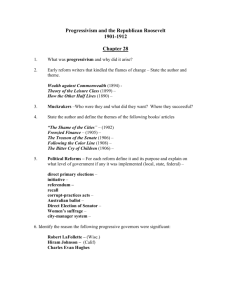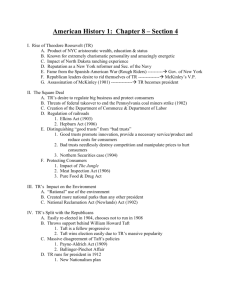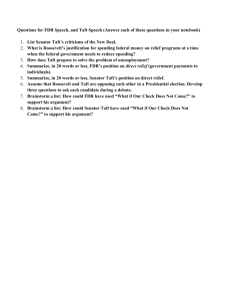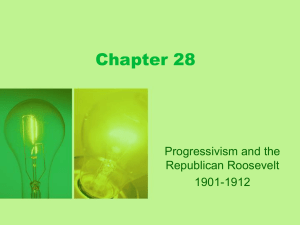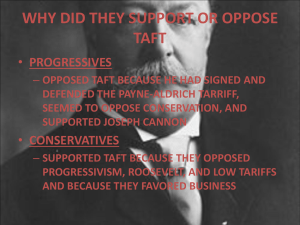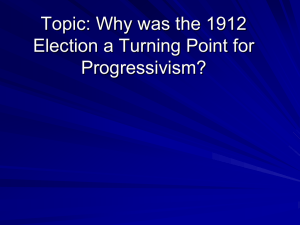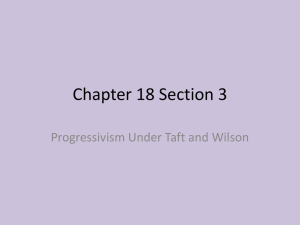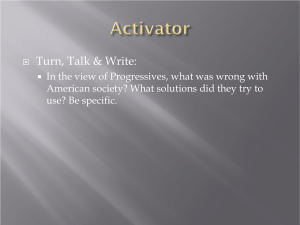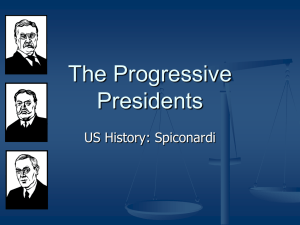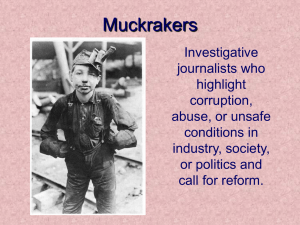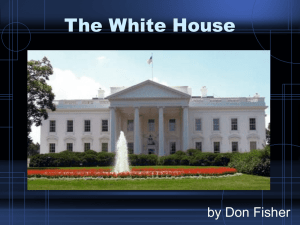Progressivism and the Republican Roosevelt
advertisement
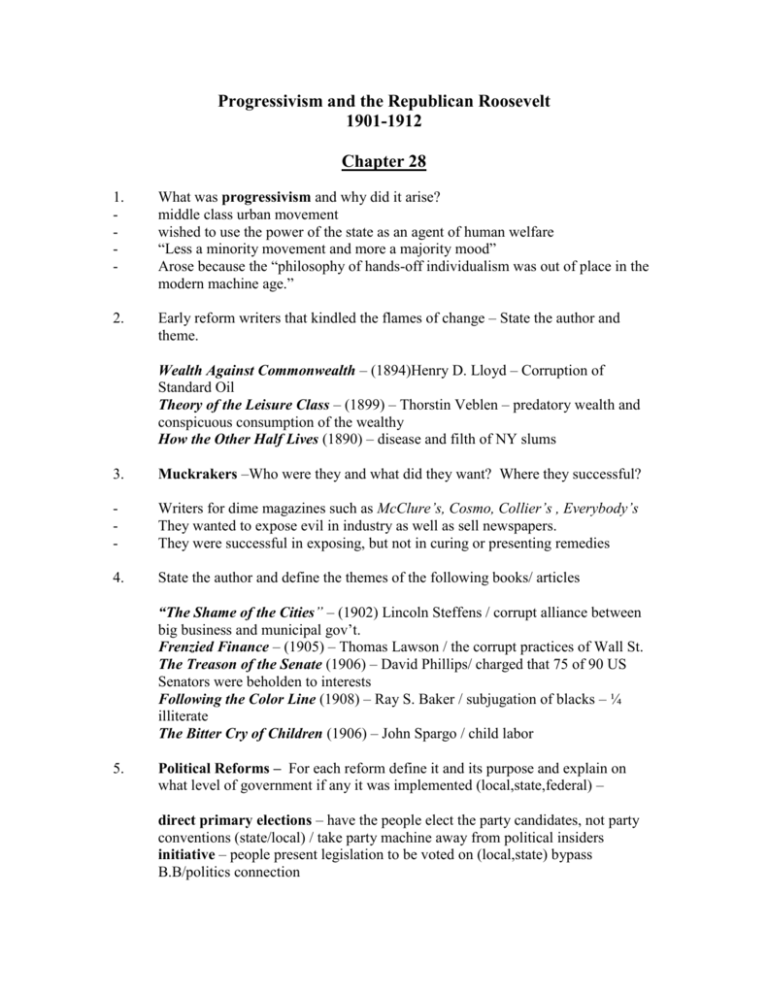
Progressivism and the Republican Roosevelt 1901-1912 Chapter 28 1. - What was progressivism and why did it arise? middle class urban movement wished to use the power of the state as an agent of human welfare “Less a minority movement and more a majority mood” Arose because the “philosophy of hands-off individualism was out of place in the modern machine age.” 2. Early reform writers that kindled the flames of change – State the author and theme. Wealth Against Commonwealth – (1894)Henry D. Lloyd – Corruption of Standard Oil Theory of the Leisure Class – (1899) – Thorstin Veblen – predatory wealth and conspicuous consumption of the wealthy How the Other Half Lives (1890) – disease and filth of NY slums 3. Muckrakers –Who were they and what did they want? Where they successful? - Writers for dime magazines such as McClure’s, Cosmo, Collier’s , Everybody’s They wanted to expose evil in industry as well as sell newspapers. They were successful in exposing, but not in curing or presenting remedies 4. State the author and define the themes of the following books/ articles “The Shame of the Cities” – (1902) Lincoln Steffens / corrupt alliance between big business and municipal gov’t. Frenzied Finance – (1905) – Thomas Lawson / the corrupt practices of Wall St. The Treason of the Senate (1906) – David Phillips/ charged that 75 of 90 US Senators were beholden to interests Following the Color Line (1908) – Ray S. Baker / subjugation of blacks – ¼ illiterate The Bitter Cry of Children (1906) – John Spargo / child labor 5. Political Reforms – For each reform define it and its purpose and explain on what level of government if any it was implemented (local,state,federal) – direct primary elections – have the people elect the party candidates, not party conventions (state/local) / take party machine away from political insiders initiative – people present legislation to be voted on (local,state) bypass B.B/politics connection referendum – people vote on pieces of legislation (local,state) bypass B.B/politics connection recall – elected officials could be voted out of office in the middle of the term if there was malfeasance or corruption (local/state) corrupt-practices acts – limit the amount of money candidates could spend on their campaigns / this would prevent the “buying” of elections (state) Australian ballot – secret vote on bills / this way businesses wouldn’t know if their bribery was working (state/local) Direct Election of Senator – people, not state legislators, elect US Senate (passed on the fed. level with 17th amendment) Women’s suffrage – vote for women to bring benefits of maternalism into the political arena. Change laws on Human interest subjects (sanitation, child labor, etc.) / 19th amendment in 1920 city-manager system – hire a professional city manager to run the city / no elected and thus paid off mayor. 6. Identify the reason the following progressive governors were significant: Robert LaFollette – (Wisc.) took on the RxR and lumber interests and won, devised a scheme to regulate public utilities Hiram Johnson – (Calif) broke the Southern Pacific RxR interests in Calif. politics Charles Evan Hughes – investigated malpractice by the ins. and gas cos of NY Women Suffrage 7. What areas of reform were women most concerned with? temperance, vote, sweatshops, child labor, factory safety, workmen compensation 8. Identify these groups, people or court cases – National Consumers League – pushed for healthier products Women’s Bureau – part of Dept. of Labor, agency in Fed. gov’t Florence Kelley – improved factory conditions/ Ill. first chief factory inspector Woman’s Christian Temperance Union – pushed to ban alcohol and were tight with the Anti-Saloon League Triangle Shirtwaist Fire – Sweatshop in NY caught fire. over 100 girls plunged to their deaths to escape. Only one fire escape and it was pad locked. Need for safety reform. Muller v.Oregon (1908) constitutional to mandate special protection for women. Though later it will close some jobs to females and appear to be chavenistic, it was the first time the court had intruded into the hiring practices of businesses. Lochner v. NY (1905) – setback / invalidated a law that set a 10 hour workday for bakers. / but in 1917 court upheld 10 hour workdays for factory workers. Teddy Roosevelt – The Square Deal * Did Teddy Roosevelt make good on his promises of a square deal for all Americans? 9. Square Deal – What was it? 10. Labor: Define the following incidences or agencies. Any limits on how far these reforms went? Anthracite Coal Strike (1902) – What happened and how did TR respond? Why was the outcome significant? - coal companies to cut wages, locked out workers/ TR called them to White House – owners inflexible – TR threatens to open mines with Federal troops / first time that Pres. stepped in on side of labor / owners give 10% raise Department of Commerce and Labor – (1903) – Cabinet level position Bureau of Corporations – investigate businesses engaged in interstate commerce 11. Corporations: Define the following acts or concepts concerning the square deal and control of corporations. Any limits to how far these reforms reached? Elkins Act (1903) – Heavy fines could now be imposed on RxRs that gave rebates and shippers that accepted them. Hepburn Act (1906) – free passes severely restricted./ ICC reach to express companies, sleeping-care monopolies and pipelines / Given power – could authorize nullification of existing rates and stipulation of max. rates ** Very important Good Trust vs. Bad Trusts – bigness doesn’t mean badness/ good – adhere to gov’t policy and regulation – bad – do not Northern Securities Co. (1904) – TR goes after this monopoly owned by J.P Morgan and Hill in N.W. rxrs. Courts rule – it’s dissolved. J.P. Morgan’s US Steel and Tenn. Coal Co. deal (1907) – TR gives his blessing to JP to acquire this company and it actually gets bigger (Taft will go after in 1910) 12. Consumers: Define the following acts or concepts concerning the square deal and protection for American consumers. Any limits to how far these reforms reached? The Jungle – Written by Upton Sinclair – it was a socialist tract that never materialized as such but hit the stomach of America Meat Inspection Act (1906) federal inspection of meat shipped over state lines/ helped them with overseas markets/ protected consumers and drove out of business smaller producers Pure Food and Drug Act (1906) – prevented the adulteration and mislabeling of foods and drugs. 13. Conservation: Define the following acts concerning conserving American natural resources. Any limits to how far these reforms reached? * (Carey Act of 1894)- fed. gov’t dist. fed. land to states on the condition that it be irrigated and settled Newlands Act of 1902 – revenues from the sale of western land would be put towards irrigation projects. settlers paid cost of reclamation from taxes on their products and the money set into a “revolving fund” to pay for more projects. Expansion of Federal Reserve lands – TR set aside 125 million acres of timber and coal as well as water resources. “multiple-use resource management” – combine rec., sustained-yield logging, watershed protection, and summer stock grazing on same land. 14. What was the basic cause of the Panic of 1907? Why did business blame Roosevelt and how did TR respond? What was the result? - runs on banks, overspeculation in industry was cause he had upset the apple cart with his growing calls for more protections for workers, more stringent controls of business, taxing incomes, etc. Constriction of currency caused need for elasticity and thus the Aldrich-Vreeland Act - 15. Currency reform: Define – Aldrich-Vreeland Act (1908) – allowed national banks to issue emergency currency backed by various means of collateral (more money in circulation) * Federal Reserve Act (1913) – created a federal reserve system that would have much more flexibility in moving gold around the country and issuing fed. reserve notes. 16. Assess TR’s legacy – - “Bark louder than bite” – fought many sham battles to make business more amenable to regulation. Busted fewer trusts than Taft He protected capitalism against popular indignation and socialism, b/w - individualism and paternalistic collectivism Inc. power and prestige of Pres., shped the progressive movement and the later liberal reform movements of the 20th century. Opened eyes of Am. that they had responsibilities internationally - William H. Taft – Politically Inept 17. - William Taft - Characterize his personality. large, moderate believer in the status quo – looked to the Constitution first 18. - * Who were the insurgents? Old Guard? radical progressives / status quo and business interest 19. - Dollar Diplomacy – Define this policy and analyze its effectiveness. American dollars need to go abroad and be invested in regions and areas before other countries get there. “Flag will follow investment” Manchurian RxR scheme – Am. banks prodded to go in and finance the RxRs that Japan and Russia owned in Manchuria, but it will fall apart, - neither country would be willing to give up their influence (weakness of policy) Nicaragua and Haiti – US marines will need to be sent in after investments are threatened by insurgents. - - 20. - - How effective was Taft in the area of breaking trusts and looking out for the consumer in tariff legislation and Conservation?? broke more trusts than TR, and split with TR over his going after Morgan’s US Steel after TR had given it his blessing/ (just not as loud as TR) Payne-Aldrich Tariff –(1909) – supposedly it started as a moderately reductive tariff and then rates increased as Senators tacked on hundreds of amendments. Opposite of what Taft had promised in Campaign – He signs and says with foot in mouth – “This is the best bill that the Republican party ever passed.” Conservation – Bureau of Mines est. that protected millions of acres of coal lands and protected water-power sites from private development. but erased with the Ballinger-Pinchot quarrel – Ball. opened some western lands to development and Pinchot (TR’s picked conservationist) objected – Taft fired him and TR and legions attacked him as anti-conservationist – Split in Rep. party wide now. 21. What two issues drove a wedge between TR (insurgents) Republicans and Taft (Old Guard) Republicans and led TR to run as the Bull Moose Party candidate in 1912? - Tariff and Ballinger-Pinchot controversy discarding of TR’s “my policies” by Taft 22. New Nationalism – What was it? - gov’t needs to increase its power to remedy social and economic evils * big government over Big business
